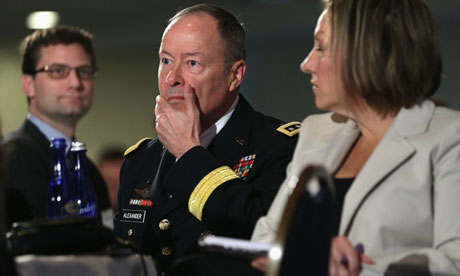Indi Guy
Indi Guy's JournalA CEO who resisted NSA spying is out of prison. And he feels ‘vindicated’ by Snowden leaks...
Source: Washington Post
Just one major telecommunications company refused to participate in a legally dubious NSA surveillance program in 2001. A few years later, its CEO was indicted by federal prosecutors. He was convicted, served four and a half years of his sentence and was released this month. Prosecutors claim Qwest CEO Joseph Nacchio was guilty of insider trading, and that his prosecution had nothing to do with his refusal to allow spying on his customers without the permission of the Foreign Intelligence Surveillance Court. But to this day, Nacchio insists that his prosecution was retaliation for refusing to break the law on the NSA's behalf.
After his release from custody Sept. 20, Nacchio told the Wall Street Journal that he feels "vindicated" by the content of the leaks that show that the agency was collecting American's phone records.
Nacchio was convicted of selling of Qwest stock in early 2001, not long before the company hit financial troubles. However, he claimed in court documents that he was optimistic about the firm's ability to win classified government contracts — something they'd succeeded at in the past. And according to his timeline, in February 2001 — some six months before the Sept. 11 terrorist attacks — he was approached by the NSA and asked to spy on customers during a meeting he thought was about a different contract. He reportedly refused because his lawyers believed such an action would be illegal and the NSA wouldn't go through the FISA Court. And then, he says, unrelated government contracts started to disappear.
His narrative matches with the warrantless surveillance program reported by USA Today in 2006 which noted Qwest as the lone holdout from the program, hounded by the agency with hints that their refusal "might affect its ability to get future classified work with the government." But Nacchio was prevented from bringing up any of this defense during his jury trial — the evidence needed to support it was deemed classified and the judge in his case refused his requests to use it. And he still believes his prosecution was retaliatory for refusing the NSA requests for bulk access to customers' phone records. Some other observers share that opinion, and it seems consistent with evidence that has been made public, including some of the redacted court filings unsealed after his conviction...
Read more: http://www.washingtonpost.com/blogs/the-switch/wp/2013/09/30/a-ceo-who-resisted-nsa-spying-is-out-of-prison-and-he-feels-vindicated-by-snowden-leaks/
NSA Employee Spied on Nine Women Without Detection, Internal File Shows...
Source: the guardian
A National Security Agency employee was able to secretly intercept the phone calls of nine foreign women for six years without ever being detected by his managers, the agency's internal watchdog has revealed.
The unauthorised abuse of the NSA's surveillance tools only came to light after one of the women, who happened to be a US government employee, told a colleague that she suspected the man – with whom she was having a sexual relationship – was listening to her calls.
The case is among 12 documented in a letter from the NSA's inspector general to a leading member of Congress, who asked for a breakdown of cases in which the agency's powerful surveillance apparatus was deliberately abused by staff. One relates to a member of the US military who, on the first day he gained access to the surveillance system, used it to spy on six email addresses belonging to former girlfriends.
The letter, from Dr George Ellard, only lists cases that were investigated and later "substantiated" by his office. But it raises the possibility that there are many more cases that go undetected. In a quarter of the cases, the NSA only found out about the misconduct after the employee confessed...

General Keith Alexander said abuse of the NSA's powerful monitoring tools were 'with very rare exception' unintentional mistakes. Photo: Alex Wong/Getty Images
Read more: http://www.theguardian.com/world/2013/sep/27/nsa-employee-spied-detection-internal-memo
Obama Administration Had Restrictions on NSA Reversed in 2011...
Source: Washington Post
The Obama administration secretly won permission from a surveillance court in 2011 to reverse restrictions on the National Security Agency’s use of intercepted phone calls and e-mails, permitting the agency to search deliberately for Americans’ communications in its massive databases, according to interviews with government officials and recently declassified material.
In addition, the court extended the length of time that the NSA is allowed to retain intercepted U.S. communications from five years to six years — and more under special circumstances, according to the documents, which include a recently released 2011 opinion by U.S. District Judge John D. Bates, then chief judge of the Foreign Intelligence Surveillance Court.
What had not been previously acknowledged is that the court in 2008 imposed an explicit ban — at the government’s request — on those kinds of searches, that officials in 2011 got the court to lift the bar and that the search authority has been used.
Together the permission to search and to keep data longer expanded the NSA’s authority in significant ways without public debate or any specific authority from Congress. The administration’s assurances rely on legalistic definitions of the term “target” that can be at odds with ordinary English usage. The enlarged authority is part of a fundamental shift in the government’s approach to surveillance: collecting first, and protecting Americans’ privacy later...
Read more: http://www.washingtonpost.com/world/national-security/obama-administration-had-restrictions-on-nsa-reversed-in-2011/2013/09/07/c26ef658-0fe5-11e3-85b6-d27422650fd5_story.html
Profile Information
Member since: Sat Oct 13, 2007, 07:04 AMNumber of posts: 3,992